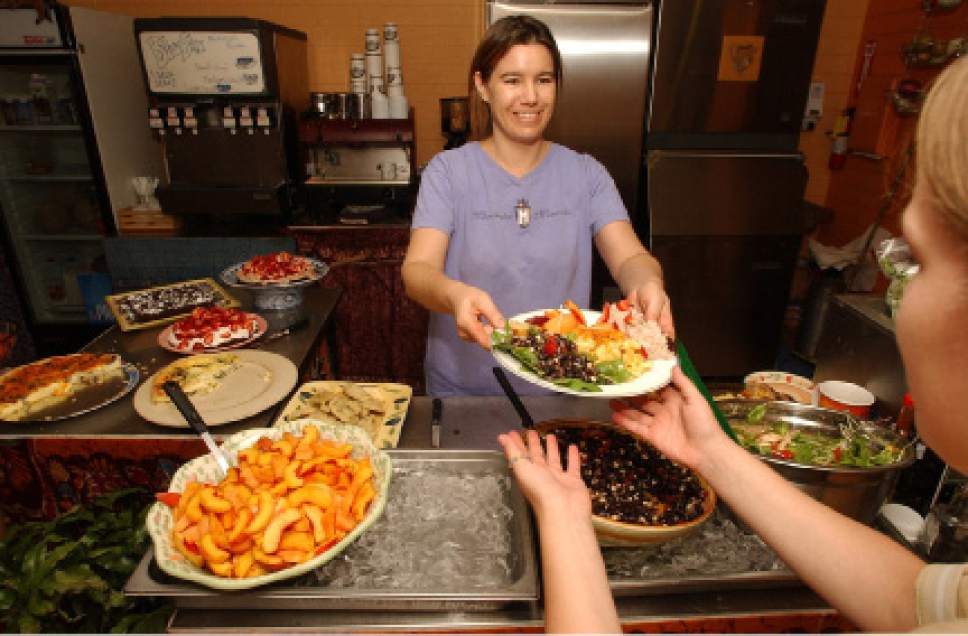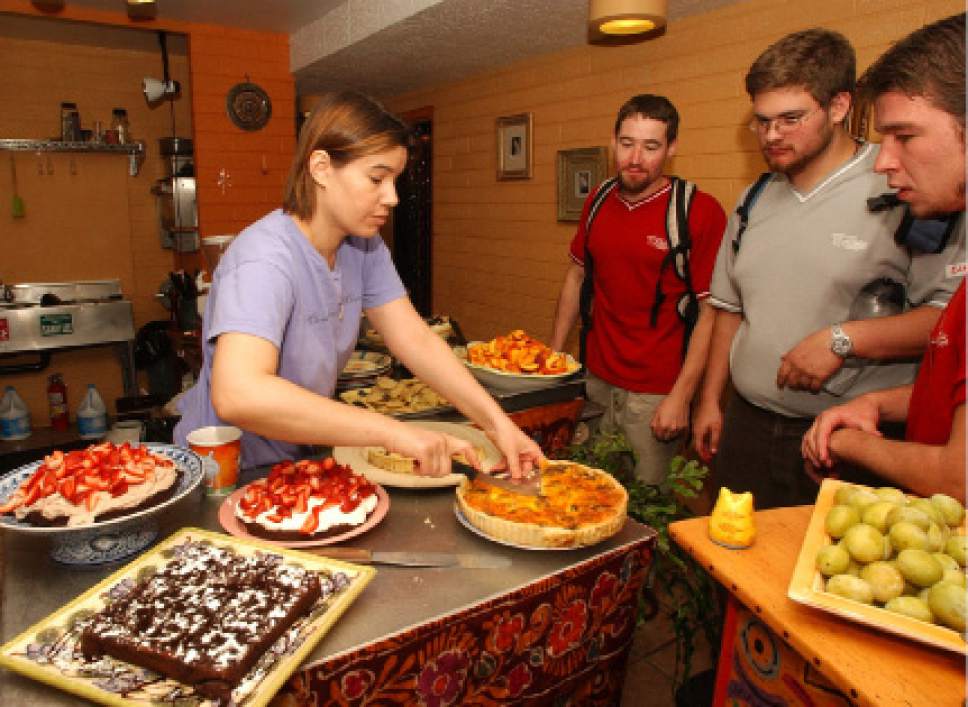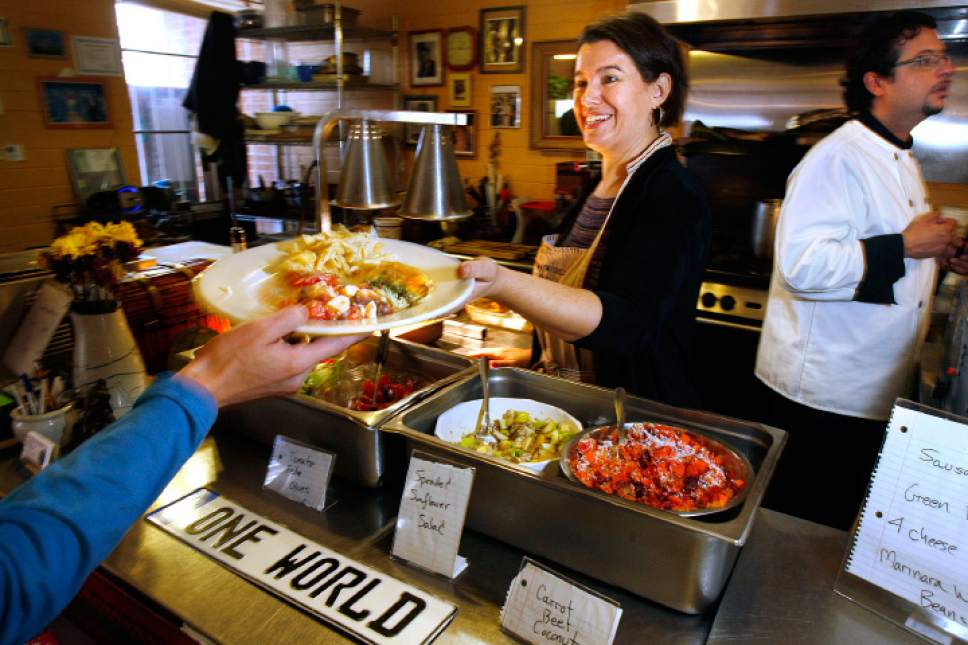This is an archived article that was published on sltrib.com in 2017, and information in the article may be outdated. It is provided only for personal research purposes and may not be reprinted.
Chicago • Denise Cerreta calls it her "Field of Dreams" moment, when she closed her established acupuncture clinic in downtown Salt Lake City in 2003 to open the One World Everybody Eats Cafe — a restaurant with no set prices.
Similar to the reaction Kevin Costner's character inspired in the 1989 movie with his if-you-build-it-they-will-come vision, "People were really concerned that I had lost it," Cerreta acknowledges. Who lets customers pick their portion size and pay what they can? How could she possibly make a profit?
Cerreta, though, wasn't interested in dollars. She wanted to make a difference.
That small seed planted in Salt Lake City 14 years ago has taken root and blossomed into a network of 65 "pay what you can" cafes in communities across the country, with dozens more in development. Combined, the restaurants serve more than 1.3 million meals a year.
While each cafe operates slightly differently to meet the needs of its local community, in every one there are customers who can pay full price — or more — which covers the cost of food for those less fortunate.
And while the original closed years ago, the lessons learned in Salt Lake City help Cerreta guide the growth of the new crop of cafes, along with a board of directors, through the nonprofit One World Everybody Eats foundation.
For her years of work fighting hunger, Cerreta received the James Beard Foundation's 2017 Humanitarian of the Year award Monday. The James Beard awards are considered the Oscars of the culinary world, with the Humanitarian of the Year honor recognizing an individual or organization working to improve the lives of others.
"Food has the power to nurture, strengthen and heal, and Denise has harnessed that power like a superhero," said celebrity chef Art Smith, who presented the award to Cerreta before a crowd of more than 3,000 of the nation's top chefs and restaurant owners gathered at Chicago's historic Lyric Opera House.
After the ceremony, Smith, who won the humanitarian award in 2007 and was the chef to former Florida Gov. Jeb Bush and television personality Oprah Winfrey, again praised Cerreta, saying she, like most in the food world, "wishes everyone had wholesome delicious food in reach of them."
—
Not in the plan • Opening an unorthodox cafe wasn't what Cerreta planned when she moved to Utah in 1996 to start an acupuncture clinic. But over time, her interest in Chinese medicine waned and her vision for the altruistic cafe became more clear.
She closed her practice and opened the One World Everybody Eats Cafe at 41 S. 300 East. It was a for-profit business, with a nonprofit mission to feed those who were less fortunate.
Customers chose from offerings prepared fresh each day, usually soup, one or two salads, quiche, a main entree and a dessert. They also decided how much — or little — they wanted to eat, eliminating food waste. At the end of the line, patrons paid what they could.
People who had money usually paid more because they could and they liked the concept, Cerreta said. Those who were less financially stable paid less or could volunteer.
Cerreta's idea of a "hand up, not a handout" was featured in newspaper articles and television reports and the cafe quickly gained national attention.
Salt Lake City diners were avid supporters. Besides frequenting the restaurant, they volunteered their time and donated money, equipment, furniture, even a car to the cause.
Cerreta's early customers helped name the restaurant, calling it One World after the green and blue Earth banner that hung above the front porch.
The irony is that the cafe that got the One World movement started ultimately failed.
"I opened that cafe knowing nothing. It should have been out of business five or six times," Cerreta said before the James Beard Award ceremony. "It's a testimony to Salt Lake and how they really got the concept."
For five years, the cafe "was really making a surplus and doing its mission," Cerreta said, but two things pushed it toward its ultimate demise.
Cerreta had begun to switch gears, working with her newly formed foundation to open cafes in places such as Denver and Spokane, Wash. She spent a lot of time out of state and handed the day-to-day operations to someone else.
Then there was the downturn in the national economy.
While Cerreta was busy expanding, the Salt Lake City cafe nearly collapsed — too many employees, losses of $8,000 to $10,000 a month, bounced paychecks.
Meal donations dropped from $10 to $7. Cerreta and her board fired the longtime manager. Staff walked off the job and criticized Cerreta's management. Even talk-show host Rush Limbaugh chastised her troubles on his national radio show.
A decade later, Cerreta said she takes full responsibility for the problems, but it was a learning experience that helped her create a clearer vision and avoid pitfalls in other cities.
"It helped me write the reverse manual: Here's what not to do," she said jokingly.
After the financial struggles, Cerreta hired new employees and the Salt Lake City cafe hung on for another 18 months or so, enough time for communities in other cities to see that the business model could work.
For the cafes to work, she said, there has to be someone on site who is "the visionary, someone to hold the torch."
She compared her original cafe to a rocket booster whose job it is to lift the spacecraft off the ground, but then falls back to Earth. "It was part of the ship that needed to come off," she said.
Cerreta would be thrilled if someone in Salt Lake City stepped up to create another One World Cafe. With the history already in place, "you could have one or two or three," she said. "The more the merrier, because they can share the burden of food insecurity."
—
The model spreads • In Denver, the SAME Cafe — So All May Eat — recently celebrated its 10th anniversary, making it the oldest pay-what-you-can diner in the country. Owner Brad and Libby Birky say they wouldn't have been successful without Cerreta and Salt Lake City.
"We read an article about the cafe and said, 'This is what we want to do,' " said Brad Birky. They took a road trip to Salt Lake City, volunteered at the cafe, asked Cerreta dozens of questions.
Later, Cerreta spent months in Denver helping them place the tile flooring and paint. She would work with the contractors while Brad, a computer consultant, and Libby, a schoolteacher, continued to work their day jobs.
"There's nobody else in this pay-what-you-can world that has worked as hard as she has to build momentum for the concept," Birky said. "She's loving and caring and supportive, no matter what it is you're trying to do."
Christina May, a One World board member, said even though Salt Lake City's cafe didn't survive, the longevity of the SAME Cafe in Denver is proof that the concept can work. "It appeals to our basic nature to give something back," she said.
In every community, "we have loyal patrons who consistently pay it forward," she said. "They get something out of it too, enjoying a great meal."
The ability to let individual cafe owners follow the pay-what-you-can model, yet still adapt the businesses to fit their communities, was one of several reasons the James Beard Foundation selected Cerreta and One World.
The selection committee was "intrigued" that the cafes followed a general model, but could decide what worked best for their community, said Kathleen Purvis, food editor for The Charlotte Observer in North Carolina and a member of the James Beard nominating committee.
"It allows people a lot of freedom to do what they need to do where they are," she said.
The cafes also approach hunger and food insecurity differently, Purvis said. People are able to interact and "have ownership of what they eat," rather than just being an anonymous person in line at a soup kitchen.
"The model," she added, "is a game changer."
2017 James Beard restaurant and chef award winners
Chef Michael Solomonov of Zahav in Philadelphia took home the outstanding chef award Monday night at the James Beard Awards, and Chicago's Rick Bayless' high-end Mexican eatery Topolobampo won the outstanding restaurant honor. Another Philadelphia foodie — Stephen Starr of Starr Restaurants — won the outstanding restaurateur award at a ceremony many consider the Oscars of the culinary world.
Here's the full list of winners:
—
National restaurant and chef awards
Best New Restaurant • Le Coucou in New York
Outstanding Baker • Mark Furstenberg of Bread Furst in Washington
Outstanding Bar Program • Arnaud's French 75 Bar in New Orleans
Outstanding Chef • Michael Solomonov of Zahav in Philadelphia
Outstanding Pastry Chef • Ghaya Oliveira of Daniel in New York
Outstanding Restaurant • Topolobampo in Chicago
Outstanding Restaurateur • Stephen Starr of Starr Restaurants in Philadelphia
Outstanding Service • Blue Hill at Stone Barns in Pocantico Hills, N.Y.
Outstanding Wine Program • Canlis in Seattle
Outstanding Wine, Beer or Spirits Professional • Sam Calagione of Dogfish Head Craft Brewery in Milton, Del.
Rising Star Chef of the Year • Zachary Engel of Shaya in New Orleans
—
Restaurant design awards
75 Seats and Under • Firm: AvroKO; Designers: Kristina O'Neal, William Harris, Adam Farmerie and Greg Bradshaw; Project: SingleThread, Healdsburg, California
76 Seats and Over • Design Firm: Meyer Davis; Designers: Will Meyer, Gray Davis and Katie McPherson; Project: St. Cecilia, Atlanta
Design Icon • Grand Central Oyster Bar and Restaurant; New York
—
Regional chef awards
Best Chef: Great Lakes (Illinois, Indiana, Michigan, Ohio) • Sarah Grueneberg of Monteverde in Chicago
Best Chef: Mid-Atlantic (District of Columbia, Delaware, Maryland, New Jersey, Pennsylvania, Virginia) • Greg Vernick of Vernick Food and Drink in Philadelphia
Best Chef: Midwest (Iowa, Kansas, Minnesota, Missouri, Nebraska, North Dakota, South Dakota, Wisconsin) • Kevin Nashan of Sidney Street Cafe in St. Louis
Best Chef: New York City (Five Boroughs) • Marco Canora of Hearth
Best Chef: Northeast (Connecticut, Massachusetts, Maine, New Hampshire, New York state, Rhode Island, Vermont) • Andrew Taylor and Mike Wiley of Eventide Oyster Co. in Portland, Maine
Best Chef: Northwest (Alaska, Idaho, Montana, Oregon, Washington, Wyoming) • Gabrielle Quiñónez Denton and Greg Denton of Ox in Portland, Ore.
Best Chef: South (Alabama, Arkansas, Florida, Louisiana, Mississippi, Puerto Rico) • Rebecca Wilcomb of Herbsaint in New Orleans
Best Chef: Southeast (Georgia, Kentucky, North Carolina, South Carolina, Tennessee, West Virginia) • Steven Satterfield of Miller Union in Atlanta
Best Chef: Southwest (Arizona, Colorado, New Mexico, Oklahoma, Texas, Utah) • Hugo Ortega of Hugo's in Houston
Best Chef: West (California, Hawaii, Nevada) • Corey Lee of Benu in San Francisco
—
America's Classics
Bertha's Kitchen, Charleston, S.C. • Owners: Julia Grant, Linda Pinckney and Sharon Coakley
Gioia's Deli, St. Louis • Owner: Alex Donley
La Taqueria, San Francisco • Owner: Miguel Jara
Sahadi's, Brooklyn, N.Y. • Owners: Christine Sahadi Whelan and Ron Sahadi
Schultz's Crab House, Essex, Md. • Owners: Chrissy Burkman, Stephanie Kell, Jason McKinney, Michelle McKinney, Robert A. McKinney Jr. and Stephan McKinney
—
Who's Who of Food & Beverage in America
Roger Berkowitz • President and CEO, Legal Sea Foods, Boston
Suzanne Goin • Multiple James Beard Award-winning chef and restaurateur, Los Angeles
Evan Kleiman • Culinarian; host of KCRW's "Good Food," Los Angeles
Michel Nischan • Multiple James Beard Award-winning chef; founder, president and CEO of Wholesome Wave, Bridgeport, Conn.
Rajat Parr • Domaine de la Côte, Lompoc, Calif.
—
Humanitarian of the Year • Denise Cerreta of One World Everybody Eats in Salt Lake City
—
Lifetime Achievement Award • Nora Pouillon of Restaurant Nora in Washington
— The Associated Press







